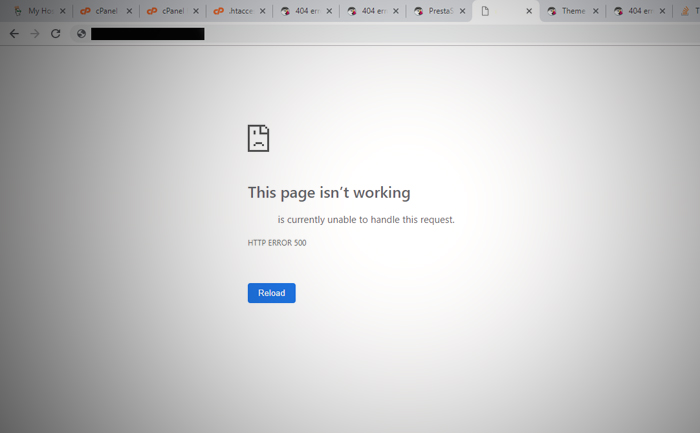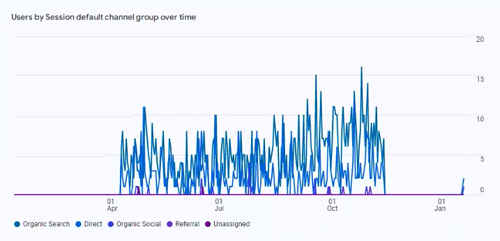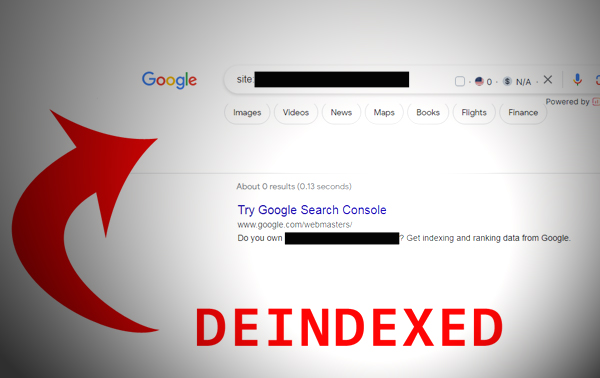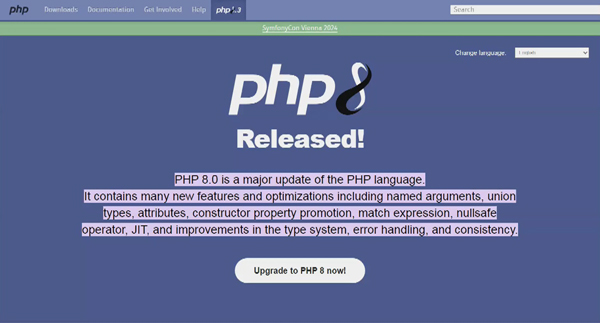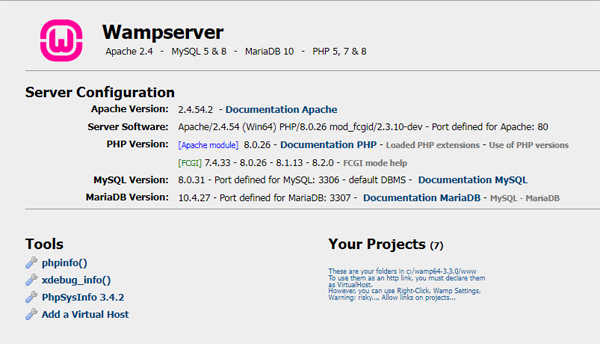If you don’t maintain your webhosting PHP version as well as all the WordPress software, your business website can break, go offline and disappear from search engines.
Whether you have a website already or whether you’re thinking of having one, if it is built on WordPress.org be aware that active, regular management is necessary to ensure full functionality and uptime.
WordPress is a truly amazing CMS (content management system) for business websites and yet people routinely ignore or disregard the software it depends on. 🧩
Here Today, Gone Tomorrow
So what happens if you don’t keep your WordPress website software and the web hosting software up to date?
First of all, a quick overview on WordPress software…
Your iPhone or Android phone has core software and apps. It’s the same with WordPress, except they’re called “plugins”.
Like smartphone apps, WordPress core software and any plugins installed on your site have to be periodically updated. The updates are for functionality and security.
It’s up to you or someone who manages your WordPress website to install these updates once they’re available.
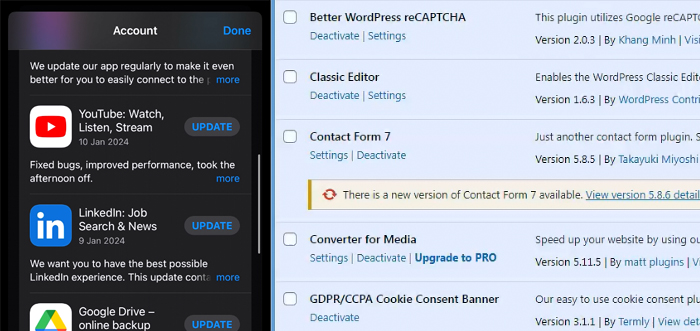
Smartphone software and apps are somewhat comparable to WordPress software
The potential issues you’re looking at when you don’t update WordPress software include:
- ⚠️ Security vulnerabilities
- ⚠️ Compatibility issues
- ⚠️ Performance degradation
- ⚠️ Bugs and errors
- ⚠️ Lack of new features
- ⚠️ Lack of support
- ⛔ Website offline and deindexed from search
When the WordPress core software, plugins (or indeed, PHP versions in the web host) aren’t kept up to date, negative consequences can arise.
Website Suddenly Offline and Lost All Organic Search Ranking
A client called me up to report his WordPress website was suddenly not working. He typed in the URL, and couldn’t access the website. The white screen of death! 😫
This is serious. I got the phone call in January but a quick look at Google Analytics 4 showed me the traffic had fell off completely in mid November. The site was down. 📉
Don’t Let Your Site Be Offline for Too Long
If your WordPress website or any website goes offline for a prolonged period of time, Google will think, “OK, so this website has been taken down. Has the business shut down?”
Because every page on a site that is no longer online will begin producing a 404 not found error, Google will take this as a cue to de-index all of the pages from their search engine.
Rankings you had previously are simply wiped out. 🕳️
How long it takes before the pages get deindexed depends on how often Google is set to crawl the content of the pages. If content is unlikely to change on certain pages, these can be set to be crawled infrequently.
If Google doesn’t crawl your site often, you might be lucky enough to maintain organic search engine positions for weeks or even months despite the content behind those results being missing.
WordPress Updated, Website Recovered
So how did the client’s website go offline? There were two contributing factors:
- ⚠️ PHP was still stuck on version 7.4
- ⚠️ WordPress core was about 12 months out of date
Everything worked out in the end. I was able to log into the web host and get the files and the database, but it was stressful. No one wants to spend Christmas and new year relaxation time battling computer-related business continuity issues.
Couldn’t Update WordPress Core Because PHP Couldn’t Be Updated
Another story. Somebody came to me with a website, which for some reason had certain plugins that wouldn’t update. Turned out I needed the Linux web server to run PHP 8.0, but that wouldn’t update either. 🙃
I got on the phone to the 123-Reg web hosting support. Two hours later, no progress had been made. All their best engineers and support people couldn’t give me a good reason why I couldn’t do what I was trying to do.
The upgrade from PHP 7.4 to PHP 8.0 had to happen in order for me to upgrade WordPress core and the plugins.
Upgraded PHP, Updated WordPress, Updated the Plugins
Only turns out there was a weird line of code in a .htaccess file, which I couldn’t even view due to weird permissions within the 123-Reg account. It was like I didn’t have full access even though I was logged in. 🛑
I figured out the solution myself while on the phone to 123-Reg (thanks Google!) and instructed them what they needed to do on their end.
Once I was able to make that PHP version upgrade, I could actually update the plugins and WordPress itself.
With some re-coding and development, plus a new SMTP service, the contact form was soon fixed. The website was able to send email messages once more. 🚀
Consider Testing Big Updates in a localhost Sandbox
The other thing is: be careful about updating stuff willy-nilly. No website is ever the same as another.
If you’ve got a particularly complicated website, back up the MySQL database and run it offline in a sandbox such as WAMP to test those major plugin updates (like WooCommerce). 🚧
As long as everything looks good and you’re satisfied, you can go ahead and make those same updates on the live website.
An Ounce of Prevention…
Every website is a moving target. Check on it frequently. It works out cheaper to have someone perform regular checks on the website – say, once a month.
Also, it’s not always just a case of just hitting the “update” button on a plugin. Website admin and maintenance can often involve rewriting CSS or other code to keep things running smoothly.
It annoys me when I update a plugin and all the nice CSS customisations that were in place no longer work because the plugin’s base code has fundamentally changed. 🪛
Avoid Unnecessary Expense and Heartache
You don’t want to be spending hundreds and hundreds of pounds if it’s an emergency to recover a website that has gone down. You don’t want to discover that years of hard work and ranking gains have been wiped out because the site was offline too long. 💔
Stay vigilante! A little bit of fear can be a good thing.
